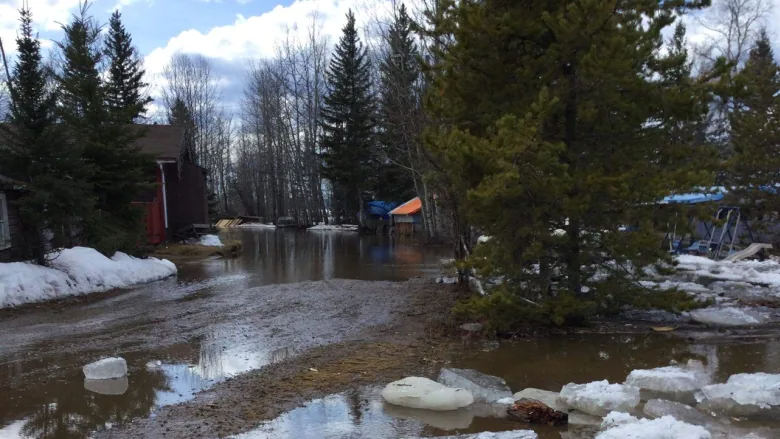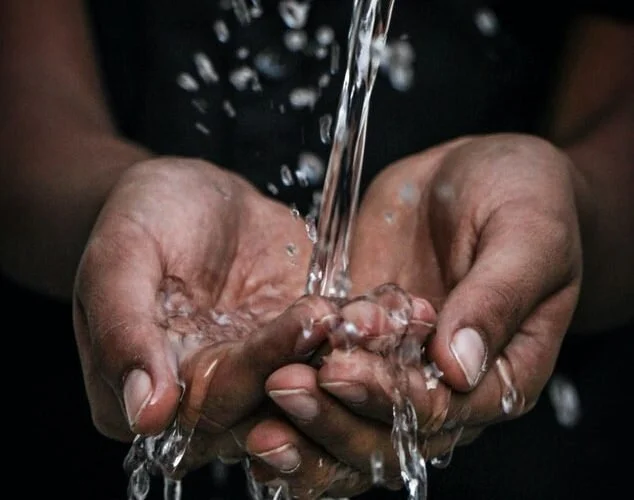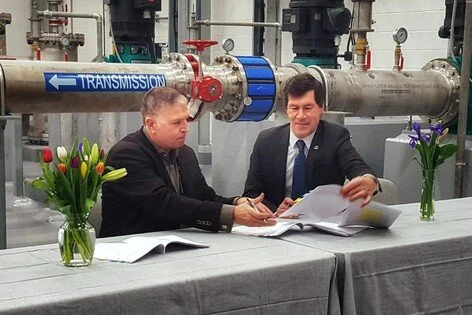"For the first time coming to the island since I was a little child, I saw corn growing," Diabo, council chief responsible for the environment portfolio at the Mohawk Council of Kahnawà:ke, said at a news conference Wednesday announcing the completion of the nearly decade-long project to restore water flow in the bay and naturalize its surroundings.
PARWU to host Open Houses on regional Water Treatment Plant this month
Prince Albert Rural Water Utility (PAWRU) has scheduled two project open houses for October to update the community on plans for a new regional Water Treatment Plant (WTP) and pipeline project to Shellbrook. PAWRU began making plans in 2021, and project members said they’ve made considerable progress over the summer. They plan to submit a technical proposal this fall, and need to gather input from subscribers, affected communities, and the public. “We are hoping the community will attend to provide valuable input and opinions from the region,” reads a PARWU press release.
Phase three of safe drinking water improvement begins in Tyendinaga Territory
The Mohawks of the Bay of Quinte – Kenhtè:ke Kanyen’kehá:ka will soon have more reliable safe drinking water at 320 more residences thanks to 21 kilometres of new water main infrastructure. Chief Donald Maracle and the Council of the Mohawks of the Bay of Quinte (MBQ) hosted a sod-turning ceremony on Monday, Oct. 3, 2022, at the corner of Beach Road and Young Street in Shannonville, marking the beginning of the third phase of the project, which has the long-term goal of contributing to the lifting of five long-term drinking water advisories in the community.
Joint news release: Neskantaga First Nation welcomes Honourable Patty Hajdu, Minister of Indigenous Services, to community
Neskantaga First Nation and Indigenous Services Canada Earlier this summer on July 23, Neskantaga First Nation welcomed the Honourable Patty Hajdu, Minister of Indigenous Services and Minister responsible for the Federal Economic Development Agency for Northern Ontario (FedNor), to the community. The Minister's visit coincided with Neskantaga's Traditional Gathering that took place from July 18 to 21, 2022, which included various ceremonies, teachings and traditional activities at the Landsdowne House site—the former location of the community. The visit also coincided with the Neskantaga First Nation pow wow, which took place from July 22 to 24, 2022. Minister Hajdu joined community members and visitors for the Grand Entry ceremony as well as other community activities throughout the day.
Infrastructure fixes to halt floods on Peguis First Nation sorely needed, leaders say
All levels of government need to come together to help solve flood-related infrastructure issues on Manitoba's largest First Nation, community leaders said. "There is serious work to do," William Sutherland, Peguis First Nation's director of emergency management, said in an interview Sunday as the flood-battered community north of Winnipeg was toiling to again try and shore up structures, roads and homes as water levels rise from recent rainfall.
'High quality water is important': Esterhazy begins construction on new water system for community, surrounding areas
It was almost fitting, on a soggy Tuesday morning, the Town of Esterhazy celebrated its recent start in constructing a $29.9 million regional water system. The rain didn’t damper the spirits of those in attendance, which included local dignitaries from both the municipal and provincial levels of government. The new water system got the boost it needed with funding from both provincial and federal levels within the Investing in Canada Infrastructure Program.
NSCC Shelburne community well project offers solutions on several fronts
The discovery of an unused drilled well at the NSCC Shelburne Campus on the Lake John Road could possibly serve as a water resource for the community. “The Shelburne Campus well water has the potential to serve as a community water supply," reads an NSCC Shelburne Campus Community Well Project proposal presented to Shelburne Municipal Council on May 11 by SEED (South End Environmental Injustice Society) volunteers Louise Lindsay and Louise Delilse.
Sambaa K'e, N.W.T., drying out after flash flood Sunday
Water levels have receded in Sambaa K'e, N.W.T., after a flash flood Sunday swamped some homes and properties. Dennis Deneron said there are still some low-laying areas with high water levels in the community of about 90 residents, but the community can begin cleanup now. The flood happened when ice blocked the main channel of Island River, which flows into Trout Lake. Deneron said that forced the water through another channel close to the community and into some people's yards.
Abbotsford farmers host free lunch to thank community for helping them through devastating floods
Abbotsford farmers hosted a free lunch on Saturday to thank community members for help and support during 2021's disastrous floods. Historic rainfall caused catastrophic floods in the Fraser Valley that damaged farms and forced thousands to flee their homes last November. The Farmers Thanking the Community event, jointly hosted by several farming industry groups, was held at the Abbotsford Exhibition Park. Guests ate a complimentary lunch featuring locally produced food, entertainment and the chance to talk to local farmers.
Breaking up: ice loss is changing one Anishinaabe fisherman’s relationship with Lake Superior
Respect for water was as much a part of Phillip Solomon’s fishing education as sawing through thick winter ice. The Anishinaabe fisherman can see how rising temperatures are changing Gitchigumi and the fish his community relies on. Sometime in the early 1990s, the ice was so unusually thick and smooth on Gitchigumi that Anishinaabe fisherman Phillip Solomon drove his car, a 1984 Monte Carlo, across the lake from Fort William First Nation to Pie Island with a friend. “There was seven feet of ice,” says Phillip, who everyone calls “Benny.” “There was no snow. We cut the hole, standing in the hole. I was standing in six feet of ice.” By the time he and his friend cut all the way through the ice, there was only a foot of water to fish in, and the two had to set their net somewhere else.
Volunteers in Abbotsford help with cleanup as receding floodwaters leave behind trail of garbage, debris
In the days following the catastrophic flooding in the southern part of B.C., including Abbotsford, receding water left behind a trail of garbage and debris in its path. Now, community volunteers are gathering to help with the cleanup. "We weren't affected for our house, but we want to help the community as much as we can," said Melissa Lippmann, who brought her husband and daughter to help pick up trash and litter at a blueberry farm in the area.
Singh and Angus visit Neskantaga First Nation: “26 years without clean water is shameful”
On Monday, NDP Leader Jagmeet Singh and NDP MP Charlie Angus (Timmins—James Bay) visited Neskantaga First Nation to talk with the community about their longstanding water crisis. In 2015, Justin Trudeau promised an end to boiled water advisories on reserve and made Neskantaga the symbol of the Liberal promise to deliver on clean water. And yet the community is now 26 years without safe water with no end in sight. Singh was in the community to hear firsthand what solutions are needed.
Government of Canada and Asubpeeschoseewagong Netum Anishinabek (Grassy Narrows First Nation) sign revised Framework Agreement for Mercury Care Home
Today, the Honourable Marc Miller, Minister of Indigenous Services, Chief Randy Fobister and elected council of Asubpeeschoseewagong Netum Anishinabek (ANA) met in community to sign an amendment to the Mercury Care Home Framework Agreement, which builds on the Government of Canada's commitment to ensuring that ANA residents who are living with methylmercury poisoning receive the care they need while staying closer to home, community and family.
First Nation community 2 hours from Toronto still doesn’t have clean, running water
For as long as she’s been alive, Chief Emily Whetung of Curve Lake First Nation says her community has been without clean, running water. “When you live in a place where you have reliable clean drinking water, you put your child in the bathtub and they play around, and they splash, and you don’t worry about it. When you live in a community that has constant water problems, you sit beside your child the entire time and make sure their face doesn’t go in the water,” said Whetung, who added the water is not only unsafe to sip but can be unsafe to the touch. “Many families in my community and others have to watch for skin conditions.”
Affordable housing, universal access to clean water among topics addressed during NDP town hall
With ongoing boil water advisories in more than 100 communities across the country, Angus said the federal government’s “blanket approach” just isn’t working, and that each community needs to be looked at independently. “For example Attawapiskat, they’re getting their water from a stagnant water pool. I don’t care how much chemicals you pour into that stagnant water, it’s not going to be safe water. Why are we not looking at getting water from a clean source? In Northern Ontario, we have multiple clean water sources. It just means the government has to spend a little more money, put the pipes a little further.”
Thirsting for Solutions
As of June 2012, there were 146 First Nations communities in Canada under a long-term Drinking Water Advisory. Drinking Water Advisories are created when the water in a community is deemed unacceptable based on the Canadian Drinking Water Guidelines which set basic parameters for clean, safe drinking water. A long-term drinking water advisory is one that has remained in place for at least one year. Some of these communities had been living under an advisory for over 20 years. First Nations communities are disproportionately affected by water quality problems as a result of longstanding water resource management issues and colonial practices of the province. The federal government has a goal to end all long-term drinking water advisories on public systems on reserves by March 2021. Since November 2015, 88 have been lifted, however 61 remain.
Coronach, Sask., under 'do not use' water advisory after treatment plant break-in
Water treatment operators in Coronach, Sask., had an unwelcome surprise Monday morning when they found the town's water treatment plant had been broken into overnight. This meant the water reservoirs that serve the 650-person town may have been contaminated. The Saskatchewan Water Security Agency has put the town under a 'do not use' advisory. This means the tap water in Coronach should not be used for anything — not drinking, not showers, not even if it's boiled — until the advisory is lifted.
'We matter like all other Canadians': Tataskweyak Cree Nation calls on Ottawa to restore clean drinking water
Tataskweyak Cree Nation (TCN) is one of more than 55 First Nation communities in Canada under a long-term boil water advisory and has been for the last four years. On Thursday, the First Nation’s Chief and NDP MP Niki Ashton called on Ottawa to restore clean drinking water. TCN has said the Canadian government has failed to deliver on the promise of clean drinking water for their community. “We can no longer ignore it anymore. We have to fight for our people," said TCN Chief Doreen Spence. "We matter like all other Canadians." Spence said they are left with no choice but to bring the issue – a basic human right – to the United Nations.
Yukon pushed to develop protections for irreplaceable wetlands threatened by mining
An independent panel is urging the Yukon government to develop a wetlands policy to protect unique streams, bogs, fens and peatland from mining because there are no known ways to fully restore these sensitive ecosystems once disturbed. Wetlands filter water, provide habitat to species and sequester carbon but are quickly being lost to development worldwide — an issue drawing attention on World Wetlands Day Feb. 2.
Read the Cold Lake Sun Article
Bonnyville residents will be drinking Cold Lake water this week after a supply agreement was signed between the Cold Lake Regional Utility Services Commission and the Bonnyville Regional Water Commission on Jan.26. The agreement details the pricing, as well as the distribution framework, with Cold Lake RUSC being the supplier of the water to the BRWSC.





















